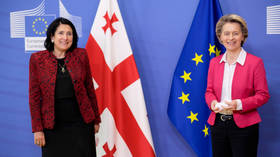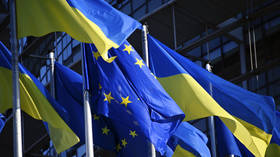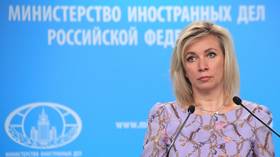Brussels points to EU hopeful’s ‘setbacks’

The EU on Saturday pointed out some “setbacks” on the part of Georgia over the past year in the implementation of reforms under the pair’s Association Agreement.
In its annual Association Implementation Report, Brussels acknowledged that Tbilisi continues “its reform path” in tough circumstances – amid the recovery from the Covid-19 pandemic and the ongoing Russian military operation in Ukraine.
“However, we have seen setbacks in the key areas of rule of law, governance and human rights,” Josep Borrell, the EU high representative for foreign affairs and security policy, said.
He urged Tbilisi, whose “European perspective” was formally recognized by the bloc in June, to take “a responsible and conscientious approach that matches its stated objectives and its citizens’ aspirations.”
The EU commissioner for neighborhood and enlargement, Oliver Varhelyi, said “the ball is now in Georgia’s court.”
“A serious commitment to democratic consolidation, judicial reforms, strengthening the rule of law as well as fight against corruption and organised crime will be key,” he added.
The EU pledged to continue supporting Georgia’s sovereignty and territorial integrity, as well as the reform process and economic development.
The Association Implementation report was published ahead of the Annual EU-Georgia Association Council, which will take place on September 6, Brussels said.
Last month, the European Commission announced that it had decided to “not rush the Georgian political elite” and to give Tbilisi “sufficient time” to work on the reforms required for granting candidate status. Michael Rupp, the European Commission’s representative at the European Parliament, said that an assessment of Georgia’s implementation of the priorities set by the EU in June will not take place before 2023.
The Association Agreement between the EU and Georgia entered into force on July 1, 2016. On March 3 this year, a week after Moscow launched its attack on Ukraine, Tbilisi submitted an application for EU membership. While Georgia did not receive candidate status, on June 23, the bloc recognized “the European perspective” of the country and confirmed its willingness “to grant candidate status once the outstanding priorities are addressed.” On the same day, the EU granted candidate status to Ukraine and Moldova, which had also applied for EU membership following the launch of Russia’s military operation.
The European Council stated in June that the progress of each country towards membership will depend not only on meeting the criteria, but also on the “EU’s capacity to absorb new members.”
Russia blasted the EU’s expansion strategy, saying that granting EU candidate status to Ukraine and Moldova proves that the bloc’s goal is to “contain” Russia.














